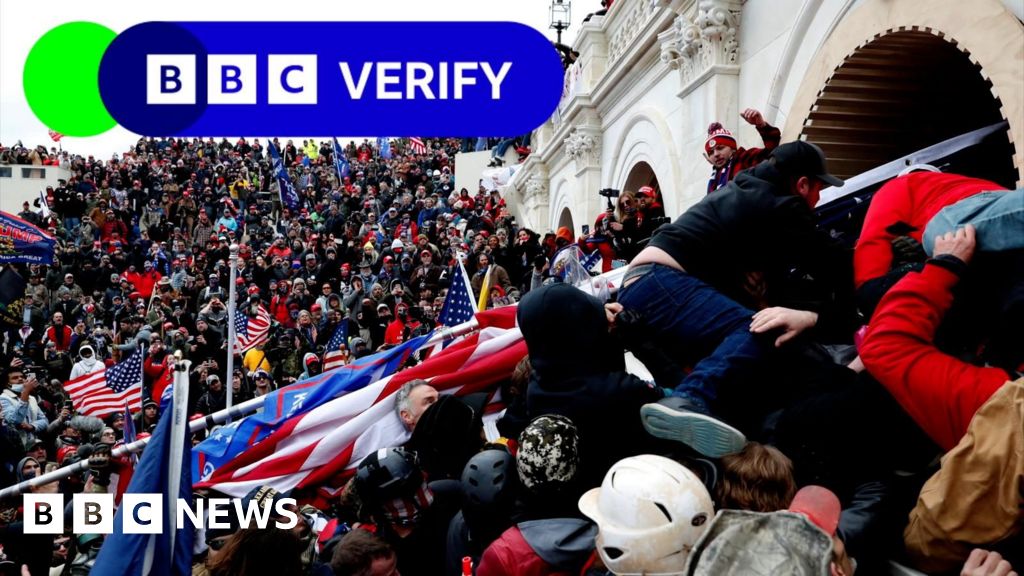ARTICLE AD BOX
By Paul Kirby
BBC News
Watch: Mario Draghi receives applause from lawmakers as he steps down after a week of turmoil
Italy is heading for new elections and months of political instability, after the man dubbed Super Mario resigned as unelected leader of a unity government.
Popular at home and abroad, Mario Draghi was brought in to lead Italy's economic recovery from the Covid pandemic but after 18 months his coalition of parties across the political spectrum collapsed.
What happens now
Italians are set to go to the polls on 25 September and Mario Draghi has been asked to stay on as caretaker prime minister. Italy is a member of Nato, the G7 and the third biggest economy in the EU, so who runs Italy matters.
On the surface not much will change, but parliament has been dissolved, halting progress towards a budget for 2023 and much needed reforms.
And whatever happens next, the days of broad-based unity government in Rome are over.
The odds are currently on a right-wing government taking power, possibly led by Giorgia Meloni, whose far-right Brothers of Italy party was not part of the Draghi coalition.
'Not such a tragedy'
Mr Draghi stabilised Italy's government and secured the trust of the EU as Rome looked to recover from the Covid pandemic. But his cabinet became increasingly fractious, with all parties having an eye on elections looming in May 2023.
And he admitted there had been growing opposition within the cabinet to important reforms.
Now a government with a fresh mandate should be in place by this autumn.
Image source, FRANCESCO AMMENDOLA/ QUIRINALE/HANDOUT
Image caption,President Sergio Mattarella announced the dissolution of parliament ahead of elections in September
"I don't think it's such a tragedy," says Prof Leila Simona Talani, head of the Centre for Italian Politics at King's College London. "The elections will be quick, which is good for international investors too, and it'll be a shorter campaign."
Italy's economy will not grind to a halt either. A caretaker government should be able to keep things ticking over and work on the 2023 budget, which will have to be passed in the coming months.
"A fully fledged government is much better, I don't deny, but many things will be able to run," says Prof Giovanni Orsina, head of the school of government at Luiss University in Rome.
Italy looks to far right
Giorgia Meloni has got her wish. The 45-year-old leader of the far-right Fratelli d'Italia (Brothers of Italy) wanted nothing to do with the Draghi government and called repeatedly for early elections.
Image source, Getty Images
With opinion polls putting FdI in the lead with 22-23% of the vote, her party with neo-fascist roots is in a strong position to head Italy's next government, along with the far-right League and centre-right Forza Italia.
Ms Meloni's owes her political origins to the neo-fascist Italian Social Movement (MSI) of the 1980s and her party is accused of attracting the support of neo-fascists.
She holds nationalist views on migration, social and cultural issues but Prof Orsina sees her now as a right-wing conviction politician who attracts mainly right-wing conservatives.
Mario Draghi has been a strong supporter of Ukraine, playing a key role in the G7 and Nato as well as the EU. A lurch to the right could change that.
Ex-foreign minister Luigi di Maio has accused the League and populist Five Star of flirting with Vladimir Putin, but Ms Meloni has taken a very strong "Atlanticist" position in favour of Ukraine since Russia's invasion.
She was previously seen as a Eurosceptic, but she knows Italians have largely warmed to the EU because of Brussels' Covid recovery aid.
Fragmentation of Italian politics
If the right wins the Italian election then a coalition deal could come in a matter of weeks, but Giovanni Orsina believes the opinion polls could change very fast during the campaign so the result could be very different. That would then mean the haggling takes longer.
Italy is no stranger to political crisis: its next government will be its 70th since World War Two. But the political map is changing fast.
"Italian politics has become very fluid; voters change their minds very easily. Parties are very weak as well and there's a big deal of fragmentation," he says.
The only two parties polling above 20% are Brothers of Italy and centre-left Democratic Party. Other than the far-right League and populist Five Star, there are no parties higher than 10%. Both Forza Italia and Five Star have seen defections.
Leila Simona Talani believes the right-wing parties may struggle to form a majority, whereas a broader group of the centre, left and some of the centre right might succeed instead.
Risk to EU Covid funds
Italy is the biggest recipient of the EU's Covid recovery fund with €191bn (£160bn) in grants and loans. But the money is tied to dozens of reforms, so there are concerns that Italians may lose out on the next instalment.
The first chunk of almost €25bn was paid out in May and Italians do not want to jeopardise the second part. For independent MP Emanuela Rossini, Italy's first concern must be to implement the national recovery plan: "It's in good hands and we will work with the European Commission on the most urgent things."
The reforms involve the economy and justice system as well as digital and green transition. And Mr Draghi has also struggled with changes to competition rules, including freeing up licences for Italy's prized beach concessions.
Prof Talani believes there is little to worry about as EU funding is "almost automatic", but sees risks ahead with the competition reforms.
Economist Lorenzo Codogno argues the government's collapse is a big blow to Rome's ability to deliver policies and reforms in the near term. But bringing the elections forward is probably better than a likely stalemate over policy.

 2 years ago
32
2 years ago
32








 English (US) ·
English (US) ·